Egypt’s Foreign Minister Badr Abdelatty vowed that Cairo will block Netanyahu’s vision of a ‘Greater Israel’
Egyptian Foreign Minister Badr Abdelatty has vowed that Cairo will not permit “Greater Israel” to become reality, denouncing recent Israeli statements as dangerous and destabilising.
Speaking at an emergency session of the Organisation of Islamic Cooperation’s (OIC) Council of Foreign Ministers regarding Israel’s genocidal war in Gaza, Abdelatty declared that Egypt “will neither accept nor permit the implementation of such notions”.
“Minister Abdelatty affirmed Egypt’s absolute rejection of recent Israeli statements concerning the illusions of what’s called ‘Greater Israel’, which reflect nothing but arrogance of power,” the Egyptian Foreign Ministry said in a statement on Monday.
The minister warned that advancing such ideas would “only fuel the conflict, expand its scale and destroy the prospects for peaceful coexistence of the peoples of the Middle East”.
The concept of ‘Greater Israel’ envisages expansion of Israel’s territory beyond its current borders, incorporating parts of Syria, Jordan, Lebanon and Egypt, along with all of the Palestinian territories, including the Gaza Strip, the West Bank and East Jerusalem.
Its roots lie in early Zionist writings and biblical interpretations, but the phrase has also been used by Israeli politicians to signal nationalist or maximalist ambitions.
Abdelatty’s comments follow remarks by Israeli Prime Minister Benjamin Netanyahu earlier this month in which he described himself as being “on a historical and spiritual mission” and said he felt emotionally tied “to the vision of a Greater Israel”.
The comments drew widespread criticism, with Cairo demanding clarification.
Several other OIC member states also voiced alarm during the emergency session.
Turkey said any revival of Greater Israel rhetoric amounted to “a declaration of war against the peoples of the region.” Iran’s representative accused Israel of seeking to “erase Palestine and destabilise every neighbour”.
Jordan called the language “reckless and provocative”, while Saudi Arabia said it undermined prospects for regional stability and normalisation.
Egypt has long regarded the displacement of Palestinians into Sinai or any encroachment on its sovereignty as a red line. Abdelatty reaffirmed during a visit to the Rafah crossing on August 18 that “we reject any Palestinian displacement from Gaza”.
He linked the rejection of displacement to the broader opposition to Greater Israel rhetoric, which in Egyptian eyes risks legitimising expansionist policies.
The invocation of Greater Israel comes at a time of heightened regional volatility. Israel’s ongoing war in Gaza and continuing strikes in neighbouring countries have already strained its ties with Middle Eastern neighbours.
Egypt’s leadership sees such rhetoric as a direct threat not only to Palestinians but to the sovereignty of states across the region.
Abdelatty told the session that Egypt would work with international partners to ensure that the “illusions” of expansion are met with a united front, and that instead the focus must return to a just settlement recognising Palestinian rights and upholding the sovereignty of neighbouring states.

